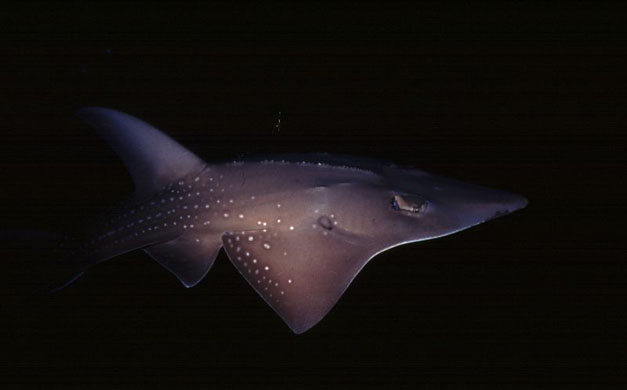TOP STORIES Google's New Site Aims to Detect Flu Outbreaks Faster
Google's New Site Aims to Detect Flu Outbreaks Faster
ABC News - www.abcnews.go.com
11 Nov 2008
J Brownstein
Area: United States
A collaboration between Google and the U.S. Centers for Disease Control and Prevention in Atlanta has yielded an online tool that may help people know about flu outbreaks even more quickly than existing surveillance methods. The new tool, called Google Flu Trends, will monitor search trends to see abnormally large numbers of searches for the flu and related terms. It will then publish a map of affected areas in its new service. Google says its new system will be able to detect influenza outbreaks up to two weeks faster than the traditional surveillance systems in use.
Related News
>>>Design Of System That Will Revolutionize Control Of Influenza Epidemics
>>>US to give FAO $44 million for avian flu control
>>>Indonesian teenager dies of bird flu
 Lead in grizzly blood during hunt season
Lead in grizzly blood during hunt seasonJackson Hole News&Guide - www.jacksonholenews.com
12 Nov 2008
C Hatch
Image courtesy of National Park Service
Area: Wyoming, United States
Researcher wonders if preliminary results show a danger to bruins from hunters’ bullets. Lead bullet fragments in offal piles could be poisoning Greater Yellowstone grizzly bears as they scavenge the remains of big game during hunting season, according to an ongoing study. The preliminary data from University of Montana graduate student Tom Rogers echoes earlier studies on ravens and eagles from researchers at Craighead Beringia South, a research institution based in Kelly. Rogers formerly worked as a Craighead Beringia South wildlife technician. Rogers checked blood samples of 24 grizzly bears for lead contamination. Of 13 bears sampled during hunting season, 46 percent showed elevated blood lead levels, which he defined as 10 micrograms of lead per deciliter.
 Evergreen E. coli outbreak traced to elk droppings
Evergreen E. coli outbreak traced to elk droppingsRocky Mountain News - www.rockymountainnews.com
11 Nov 2008
B Scanlon
Image courtesy of Dennis Schroeder
Area: Denver, Colorado, USA - Map It

The mystery behind the E. coli outbreak southwest of Denver started clearing up when all eight sickened children said they liked playing outdoors — in elk country. The medical enigma culminated in a decision by some coaches to cancel last week's midget football games in Evergreen — on fields close to where elk graze. "We track every case of E. coli 0157:H7," Gayle Miller, senior epidemiologist with Jefferson County Health and Environment, said. Usually, the outbreaks are so sporadic that no useful links can be made. This time, though, she found eight cases of the same strain. All eight kids were between 4 and 12 years old — six from Jefferson County and one each from Park and Clear Creek counties.
BIODIVERSITY: The Real Price of Farmed Salmon
IPS - www.ipsnews.net
10 Nov 2008
S Leahy
Area: British Columbia, Canada
"We've seen a regional collapse of all sea life in the 20 years since the salmon farms moved in," said Chief Bob Chamberlin of the Kwicksutaineuk Ah-kwa-mish Canadian First Nation in the province of British Columbia on Canada's west coast. "I can only shake my head in bewilderment that this is allowed to continue," Chamberlin told IPS from Gilford Island in the Broughton Archipelago, where 20 salmon farms are in operation. Scientific studies have linked sharp declines in wild salmon populations in British Columbia to disease and parasites originating in open-ocean salmon farms. Millions of non-native salmon have escaped ocean net-pens in Chile and have become an invasive species, transforming the ecology of local river systems.
 Students examine dead otter
Students examine dead otterArkansas State University - media.www.asuherald.com
10 Nov 2008
Image courtesy of Tom Risch
Area: Arkansas, United States
ASU students had the unusual experience of examining the cause of death of a sea otter that died of a strange infection caused by the morbillivirus microogranism. The male Washington sea otter was found May 21, 2007, at Rialto Beach in the Olympic National Park in Washington state. The animal was found still alive but died while being transported to a rehabilitation center. Sea otters, unlike other marine mammals, have very little body fat to protect them from the cold waters of the Pacific Northwest where they live.
OTHER WILDLIFE HEALTH RELATED NEWS
Image courtesy of Alex Smailes/Corbis - Guardian: Sharks under threat [photo gallery]
 Atlantic sharks face extinction due to overfishing and shark-finning
Atlantic sharks face extinction due to overfishing and shark-finning- Zoos a battleground against extinction
- Houston's two-year-old elephant is sick - Houston, Harris County, Texas, USA -Map It

- State DNR has new plan to control chronic wasting disease [Wisconsin]
- Offshore Wind Power Could Boost Fisheries
- Endangered Birds [Raptors migration to Mexico]

- Conservation group urges separation of Great Lakes, Mississippi basin waters
- World's oceans face marine 'invaders' threat
WILDLIFE HEALTH RELATED PUBLICATIONS
Frequent inter-species transmission and geographic subdivision in avian influenza viruses from wild birds
Virology. 2008; Epub ahead of print [on-line abstract only]
R Chen and EC Holmes
Vecotor-Borne and Zoonotic Diseases - Ahead of Print
Articles of note
- Leptospirosis in Wild and Domestic Carnivores in Natural Areas in Andalusia, Spain - J Millan et al.
- Are Carnivores Universally Good Sentinels of Plague? - RJ Brinkerhoff
- Scavenging by Mammalian Carnivores on Prairie Dog Colonies: Implications for the Spread of Plague - A Boone
Populations of migratory bird species that did not show a phenological response to climate change are declining
PNAS. 2008 Oct 21; 105(42): 16195-16200 [online article only]
AN Moller et al.
Veterinary Pathology - Nov 2008
Vol. 45, No. 6





No comments:
Post a Comment